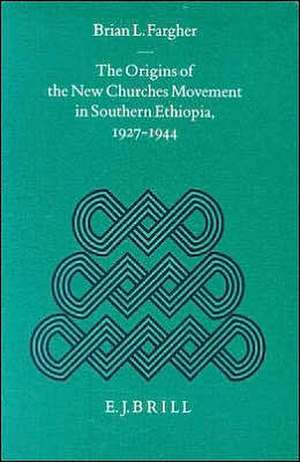The Origins of the New Churches Movement in Southern Ethiopia, 1927-1944: Studies of Religion in Africa, cartea 16
Autor Fargheren Limba Engleză Hardback – 31 iul 1996
Three of the many facets of the movement comprise the body of the book. There is the religious backdrop of Orthodox Christianity and the expatriates' fundamentalist traditions; then the praxis and polity of their work; finally the post-Occupation outcome which confirmed their choices.
Since its beginning in 1932 the New Churches Movement has impacted every part of Ethiopian society: religious, political and socio-economic. It demonstrates that a fresh start can be complementary rather than competitive. The movement's success encourages missionary-evangelists to continue making new beginnings.
Din seria Studies of Religion in Africa
- 18%
 Preț: 849.30 lei
Preț: 849.30 lei - 18%
 Preț: 615.72 lei
Preț: 615.72 lei - 18%
 Preț: 614.87 lei
Preț: 614.87 lei - 18%
 Preț: 610.49 lei
Preț: 610.49 lei - 18%
 Preț: 612.92 lei
Preț: 612.92 lei - 18%
 Preț: 613.07 lei
Preț: 613.07 lei - 18%
 Preț: 614.09 lei
Preț: 614.09 lei - 18%
 Preț: 614.00 lei
Preț: 614.00 lei - 18%
 Preț: 785.79 lei
Preț: 785.79 lei - 18%
 Preț: 616.49 lei
Preț: 616.49 lei - 18%
 Preț: 614.48 lei
Preț: 614.48 lei - 18%
 Preț: 579.17 lei
Preț: 579.17 lei - 18%
 Preț: 737.32 lei
Preț: 737.32 lei - 18%
 Preț: 573.93 lei
Preț: 573.93 lei - 18%
 Preț: 573.37 lei
Preț: 573.37 lei - 15%
 Preț: 446.86 lei
Preț: 446.86 lei - 15%
 Preț: 418.90 lei
Preț: 418.90 lei - 18%
 Preț: 541.14 lei
Preț: 541.14 lei - 18%
 Preț: 543.24 lei
Preț: 543.24 lei - 18%
 Preț: 610.52 lei
Preț: 610.52 lei - 18%
 Preț: 651.88 lei
Preț: 651.88 lei - 18%
 Preț: 620.81 lei
Preț: 620.81 lei - 18%
 Preț: 618.72 lei
Preț: 618.72 lei - 18%
 Preț: 616.77 lei
Preț: 616.77 lei - 18%
 Preț: 838.96 lei
Preț: 838.96 lei - 18%
 Preț: 647.21 lei
Preț: 647.21 lei - 18%
 Preț: 713.02 lei
Preț: 713.02 lei - 18%
 Preț: 687.53 lei
Preț: 687.53 lei - 18%
 Preț: 718.37 lei
Preț: 718.37 lei - 18%
 Preț: 681.03 lei
Preț: 681.03 lei - 18%
 Preț: 851.08 lei
Preț: 851.08 lei - 18%
 Preț: 586.73 lei
Preț: 586.73 lei - 18%
 Preț: 686.76 lei
Preț: 686.76 lei - 18%
 Preț: 1307.99 lei
Preț: 1307.99 lei - 18%
 Preț: 882.32 lei
Preț: 882.32 lei - 18%
 Preț: 813.35 lei
Preț: 813.35 lei - 18%
 Preț: 630.19 lei
Preț: 630.19 lei - 18%
 Preț: 630.19 lei
Preț: 630.19 lei - 18%
 Preț: 581.58 lei
Preț: 581.58 lei - 18%
 Preț: 611.36 lei
Preț: 611.36 lei - 18%
 Preț: 612.07 lei
Preț: 612.07 lei - 18%
 Preț: 613.29 lei
Preț: 613.29 lei
Preț: 615.47 lei
Preț vechi: 750.57 lei
-18% Nou
Puncte Express: 923
Preț estimativ în valută:
117.77€ • 123.29$ • 97.45£
117.77€ • 123.29$ • 97.45£
Carte indisponibilă temporar
Doresc să fiu notificat când acest titlu va fi disponibil:
Se trimite...
Preluare comenzi: 021 569.72.76
Specificații
ISBN-13: 9789004106611
ISBN-10: 9004106618
Pagini: 329
Dimensiuni: 162 x 243 x 27 mm
Greutate: 0.76 kg
Editura: Brill
Colecția Brill
Seria Studies of Religion in Africa
ISBN-10: 9004106618
Pagini: 329
Dimensiuni: 162 x 243 x 27 mm
Greutate: 0.76 kg
Editura: Brill
Colecția Brill
Seria Studies of Religion in Africa
Public țintă
All those interested in Mission History, history of religion in Africa, origins of new religious movements, indigenous church practice and principles, Ethiopian religion and culture, non-Orthodox churches in Orthodox countries.Notă biografică
Brian L. Fargher, Ph.D. (1988) in Mission History, University of Aberdeen, is Executive Director of the Leadership Training Centre with Campus Crusade for Christ, Edmonton, Canada.
Recenzii
'Dr. Fargher's study would not have served its purpose if it had not raised questions and created discussion. It stands as a most exciting and interesting study and will, because of its thoroughness, remain an outstanding contribution to the study of Ethiopian Evangelical Christianity. To study this book is a must for any person who seeks information about the background and history of an evangelical church which constitutes about half of the "New Churches Movement" in Ethiopia.'
Johnny Bakke, Journal of Religion in Africa, 1998.
Johnny Bakke, Journal of Religion in Africa, 1998.
